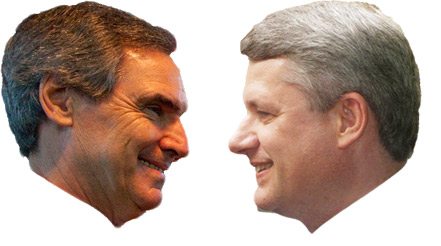A one-on-one throwdown between Harper and Ignatieff could be the most Toronto-centric idea ever
 An idea for the most Toronto-centric debate ever was floated yesterday: Stephen Harper and Michael Ignatieff in a head-to-head throwdown. Early chatter was that the University of Toronto would host such an event, which we’re pretty sure would qualify as the home-field advantage for Ignatieff. (Cue Conservatives noting wittily that his home is Harvard.) Add this to the fact that both Harper and Ignatieff were born in Toronto, and the debate could really hammer home the city’s feeling of centre-of-the-universe-ness. At first, the two leaders both seemed up for it, with Ignatieff even saying he’d go one-on-one with Harper “any place, any time.” Now, though, Harper seems to have cooled to the idea, even as Ignatieff goads him to participate.
An idea for the most Toronto-centric debate ever was floated yesterday: Stephen Harper and Michael Ignatieff in a head-to-head throwdown. Early chatter was that the University of Toronto would host such an event, which we’re pretty sure would qualify as the home-field advantage for Ignatieff. (Cue Conservatives noting wittily that his home is Harvard.) Add this to the fact that both Harper and Ignatieff were born in Toronto, and the debate could really hammer home the city’s feeling of centre-of-the-universe-ness. At first, the two leaders both seemed up for it, with Ignatieff even saying he’d go one-on-one with Harper “any place, any time.” Now, though, Harper seems to have cooled to the idea, even as Ignatieff goads him to participate.
It’s difficult to overstate how much this event would help the Liberals, both because it reinforces the message that they’re the “only party that can replace Harper” and because having Harper show up next to Ignatieff—and Ignatieff only—undoes two whole years of “coalition” messaging the Conservatives have been building. It’s sort of the photo negative of this image, which has caused the Grits so much grief.
Earlier this morning, the Conservatives clarified their position, saying that Harper “misspoke” when he said he was up for debating Ignatieff one-on-one. What the Tories meant was that Harper was willing to debate Ignatieff instead of debating all three opposition leaders, while Ignatieff is open to the one-on-one as well as the standard debates. Harper, listening to critics of the debates who thought the problem was too many white men talking to each other, thought the solution was to have fewer white men—and no women, apparently.
In that, Harper agrees with the Consortium of Broadcasters (which sounds like the worst group of superheroes ever), who are the biggest losers after yesterday’s news. They confirmed late last night that there will be two debates, and Elizabeth May is not allowed at either of them. It’s kind of amazing that in 2011 the people responsible for making this kind of decision could fit in a Fit, but the power of the TV broadcasters, who are now almost all owned by cable and phone companies, is hard to deny. The one-on-one debate, if it happens, might turn out to be a crack in their monopoly over deciding where and how debates can happen.
All of this suggests that in the next election, we might get more than two debates between the party leaders. Frankly, we hope that idea doesn’t go too far. Toronto tried the “debate everything, everywhere, all the time” thing during last year’s mayoral election, and boy, did it get old quick.
(Image: Ignetieff by Radey Barrack; Harper by Robert Thivierge)





